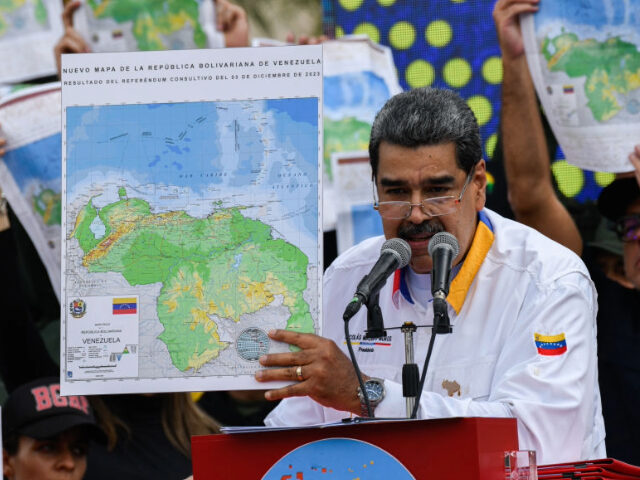Venezuela’s socialist regime accused Canada on Sunday of being a “destabilizing factor” for allegedly meddling in the territorial dispute between Venezuela and Guyana over the Essequibo region.
Venezuelan Foreign Minister Yvan Gil condemned Canada in response to statements that High Commissioner in Guyana Mark Berman reportedly issued, in which he expressed the Canadian government’s support of Guyana in the territorial dispute and urged respect for international law. Berman made the comments during an official event to observe Canada Day.
“The Canadian Government is concerned with the tensions between Guyana and Venezuela, and we reiterate that we stand with the Guyanese people. We stand with the Government, and we call for respect of international law,” Berman reportedly said. “In this complex, ever-changing global environment, good relations are paramount, and I can’t emphasize enough the importance we place on our relationship with Guyana.”
Gil responded to Berman’s statements by accusing Canada of conspiring with Guyana and Venezuelan “right-wing lackeys” to hand the contested territory to U.S. companies.
“Canada has no say in the dispute between Guyana and Venezuela over Guyana Esequiba. The failed Canadian government should mind its own business and stop being a destabilizing factor in the Caribbean region at the service of Exxon Mobil,” Gil’s message read, continuing:
The Government of Guyana should desist from involving self-conscious countries with frustrated colonialist pretensions in this controversy, which are sinking together with their lackeys of the stateless right wing who would hand over the Essequibo and the homeland to the American multinationals. The only possible and legal way to resolve this controversy is the Geneva Agreement of 1966.
Neighbors Venezuela and Guyana have maintained a territorial dispute over the Essequibo region for more than 120 years. The Essequibo is a 61,600-square-mile region currently administered by Guyana that represents roughly two-thirds of Guyana’s entire territory.
Venezuela has historically argued that the Essequibo region is part of its borders since the South American nation gained independence from Spain in 1811 — long before Hugo Chávez and his still-ruling socialist regime rose to power in 1999.
In 1899, an arbitration process in Paris established the current borders between the two countries and granted control of the contested territory to Guyana. Venezuela has claimed, for more than a century, that the Paris arbitration ruling was fraudulent at the United Nations, leading to another agreement signed in Geneva in 1966 that gave control of the Essequibo to Guyana until a permanent solution to the dispute was found.
The dispute remained relatively dormant after the 1966 agreement, never reaching a definitive conclusion. Following a request Guyana made in 2018, the International Court of Justice (ICJ) ruled in 2023 that it has jurisdiction over the dispute but pointed out that a final ruling is “years away” from being issued.
Socialist dictator Nicolás Maduro, who has repeatedly insisted that neither he nor his regime recognize the ICJ’s jurisdiction in the matter, reignited the dormant dispute with hostilities after Guyana began signing off offshore oil contracts with American oil company ExxonMobil. Maduro has repeatedly threatened Guyana and ExxonMobil, and he deployed the Venezuelan Navy to intimidate Guyana in December 2018.
The Maduro regime’s hostilities further escalated in 2023 after the rogue socialists held a sham referendum on December 2023 that asked the public “what to do” about the territorial dispute.
Despite extensive evidence that showed extremely low voter turnout and, in some cases, barren electoral centers, the Maduro regime insisted that “ten million” votes were cast in favor of the regime’s plans to annex the contested region.
The Maduro regime’s plans include the creation of a new Venezuelan state called Guayana Esequiba, consisting of the entirety of the Essequibo region. The annexation plans also include granting Venezuelan identity documents to the Essequibo’s mostly indigenous inhabitants and the eventual issuing of oil, gas, and mining licenses to exploit the region’s natural resources.
Maduro accused Guyanese President Irfaan Ali in April of allowing the United States to build “secret military bases” in the Essequibo region. Maduro, who is yet to publicly show any evidence that substantiates the accusations, claimed that the bases are part of an “aggression” campaign against Venezuela.
In February, the Center for Strategic and International Studies (CSIS) published satellite imagery taken in January that suggests the Maduro regime has expanded its military bases and personnel in the border areas with Guyana.
Venezuelan and Guyanese representatives held an online meeting hosted by the ICJ’s Presiding Judge Nawaf Salam on June 11 regarding the ongoing territorial dispute. The Maduro regime claimed that attending the meeting does not imply recognition of the ICJ’s jurisdiction in the dispute, further claiming that the 1966 Geneva Agreement is the “normative framework” to “put an end” to the dispute “through a practical settlement, acceptable and satisfactory to all parties.”
Christian K. Caruzo is a Venezuelan writer and documents life under socialism. You can follow him on Twitter here.

COMMENTS
Please let us know if you're having issues with commenting.